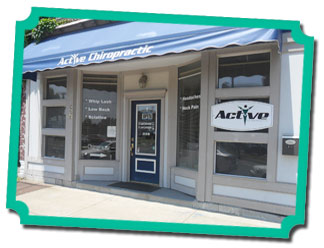 Flexion-distraction and decompression is a well-researched, well-documented, and
proven-effective technique for decompressing spinal nerves and treating low back
pain. It's a gentle, non-surgical, no-force procedure that helps the spine heal
properly - and keeps it as pain free as possible. Flexion-distraction decompresses
and realigns the spine, thus....
Flexion-distraction and decompression is a well-researched, well-documented, and
proven-effective technique for decompressing spinal nerves and treating low back
pain. It's a gentle, non-surgical, no-force procedure that helps the spine heal
properly - and keeps it as pain free as possible. Flexion-distraction decompresses
and realigns the spine, thus....
• increasing intervertebral disc height, which removes tension on the anular
fibers and the spinal nerve
and improves circulation
• dropping pressure within the nucleus pulposus of the intervertebral disc
• increasing the area of the intervertebral foramen by up to 28%
• and essentially realigning the spine by restoring vertebral joints to their
proper physiological relationships of motion.
 The forced passive flexion, extension, and rotation of vertebral segments, carrying
the elements of articulation beyond the usual range of movement to the limit of
anatomic range. Spinal manipulation may be used effectively in physiotherapy for
the treatment of vertebral and sacroiliac dislocations, sprains, and adhesions.
Adjustments, or manipulation as they’re sometimes referred to is the minor movement
of vertebrae in the spine. The objective of this movement is to realign vertebrae
that have moved out of place for a number of reasons ranging from normal daily activity
to trauma such as a car accident. When these vertebrae are out of place, it has
an overall systemic effect from muscular to the central nervous system. Without
proper alignment and flow of all nerves and systems in the body from the brain,
we can’t function at our peak.
The forced passive flexion, extension, and rotation of vertebral segments, carrying
the elements of articulation beyond the usual range of movement to the limit of
anatomic range. Spinal manipulation may be used effectively in physiotherapy for
the treatment of vertebral and sacroiliac dislocations, sprains, and adhesions.
Adjustments, or manipulation as they’re sometimes referred to is the minor movement
of vertebrae in the spine. The objective of this movement is to realign vertebrae
that have moved out of place for a number of reasons ranging from normal daily activity
to trauma such as a car accident. When these vertebrae are out of place, it has
an overall systemic effect from muscular to the central nervous system. Without
proper alignment and flow of all nerves and systems in the body from the brain,
we can’t function at our peak.
 The Activator is a small hand-held instrument with a spring inside that delivers
a high-speed, but gentle, thrust to the vertebrae or joint via a small rubber tip.
Using the activator, rather than a: manual adjustment, the patient’s muscle resistance
is not fighting against the adjustment. In contrast, a typical manual adjustment
often requires the chiropractor to move the patient into positions that are not
natural to the body, causing the patient to tense up. Patients remain in their own
clothing during adjustments, making a visit to the chiropractor quick and uncomplicated.
The Activator is a small hand-held instrument with a spring inside that delivers
a high-speed, but gentle, thrust to the vertebrae or joint via a small rubber tip.
Using the activator, rather than a: manual adjustment, the patient’s muscle resistance
is not fighting against the adjustment. In contrast, a typical manual adjustment
often requires the chiropractor to move the patient into positions that are not
natural to the body, causing the patient to tense up. Patients remain in their own
clothing during adjustments, making a visit to the chiropractor quick and uncomplicated.
 The goal of ART is to restore optimal texture, motion, and function of the soft
tissue and release any entrapped nerves or blood vessels. This is accomplished through
the removal of adhesions or fibrosis in the soft tissues via the application of
specific protocols. Adhesions can occur as a result of acute injury, repetitive
motion , and constant pressure or tension. ART® eliminates the pain and dysfunction
associated with these adhesions. The types of conditions successfully treated with
ART vary; Some of the more common conditions are:
The goal of ART is to restore optimal texture, motion, and function of the soft
tissue and release any entrapped nerves or blood vessels. This is accomplished through
the removal of adhesions or fibrosis in the soft tissues via the application of
specific protocols. Adhesions can occur as a result of acute injury, repetitive
motion , and constant pressure or tension. ART® eliminates the pain and dysfunction
associated with these adhesions. The types of conditions successfully treated with
ART vary; Some of the more common conditions are:
1 ) Carpal tunnel and other peripheral nerve entrapments.
2 ) Spinal pain and dysfuntion.
3 ) Tendonitis and other soft tissue inflammatory disorders
of the hand, wrist, elbow, shoulder, hip, knee, ankle, and foot.
4 ) Sciatica, TMJ, recurrent sprains and strains.
 Nutritional counseling is a type of assessment made which analyzes various health
needs in regard to diet and exercise. Nutritional information helps people to set
achievable health goals and teaches various ways of maintaining these goals throughout
their lifetime. Diets have been proven time after time to be nothing more than a
temporary fix. However, a lifestyle change is the key for many to achieve thier
weight loss and fitness goals.
Nutritional counseling is a type of assessment made which analyzes various health
needs in regard to diet and exercise. Nutritional information helps people to set
achievable health goals and teaches various ways of maintaining these goals throughout
their lifetime. Diets have been proven time after time to be nothing more than a
temporary fix. However, a lifestyle change is the key for many to achieve thier
weight loss and fitness goals.
